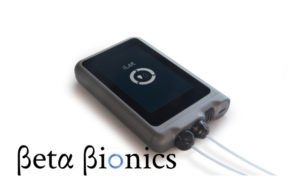 Boston-based Beta Bionics said this week that the first patients have begun home use of dasiglucagon in a clinical trial of the company’s iLet bionic pancreas system for people with Type 1 diabetes.
Boston-based Beta Bionics said this week that the first patients have begun home use of dasiglucagon in a clinical trial of the company’s iLet bionic pancreas system for people with Type 1 diabetes.
The iLet device features an autonomous, dual-chamber infusion pump that is powered by dosing algorithms. Using machine learning and data from a continuous glucose monitor, the algorithms calculate and dose insulin and/or glucagon as needed. Dasiglucagon is a stable glucagon analog developed by Zealand Pharma.
The iLet can be configured as an insulin-only bionic pancreas, a glucagon-only bionic pancreas, or a bihormonal bionic pancreas (insulin and glucagon). Beta Bionics and Zealand Pharma have partnered to carry out several co-development activities with the primary goal of obtaining regulatory approval to use dasiglucagon in the device’s bihormonal configuration.
The home-use clinical trial is being conducted by a clinical research team at Massachusetts General Hospital. The randomized, two-arm, cross-over trial will compare the operational performance of the iLet in its insulin-only configuration to that of its bihormonal configuration using dasiglucagon in adults with type 1 diabetes. Secondary objectives include assessing the impact of the insulin-only and bihormonal configurations of the iLet on glycemic control, quality of life, and treatment satisfaction among study participants, their caregivers, partners, and/or family members, according to Beta Bionics.
“The start of this home-use clinical trial with the iLet in its bihormonal configuration — autonomously and independently pumping both insulin and Zealand’s dasiglucagon — marks the achievement of a long-awaited and eagerly anticipated milestone,” said company president and CEO Ed Damiano in a news release.
“Fully automated diabetes care, realized by a dual-hormone artificial pancreas system using insulin together with dasiglucagon, could significantly improve life for millions of people living with type 1 diabetes,” said Emmanuel Dulac, president and CEO of Copenhagen-based Zealand Pharma.
In previous home-use studies in adults and children with T1D, the iLet’s algorithms demonstrated dramatic improvements in glycemic control relative to the standard of care, according to studies published in the New England Journal of Medicine (2014), Lancet Diabetes and Endocrinology (2016) and Lancet (2016).


Hi…in 1995, I had a total Pancreatectomy performed by Dr. Andrew Warshaw…I am totally intrigued by this system…is it too late for me to be included?